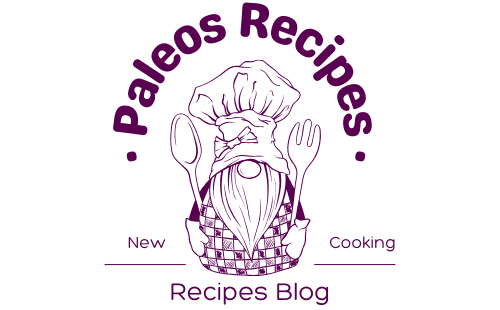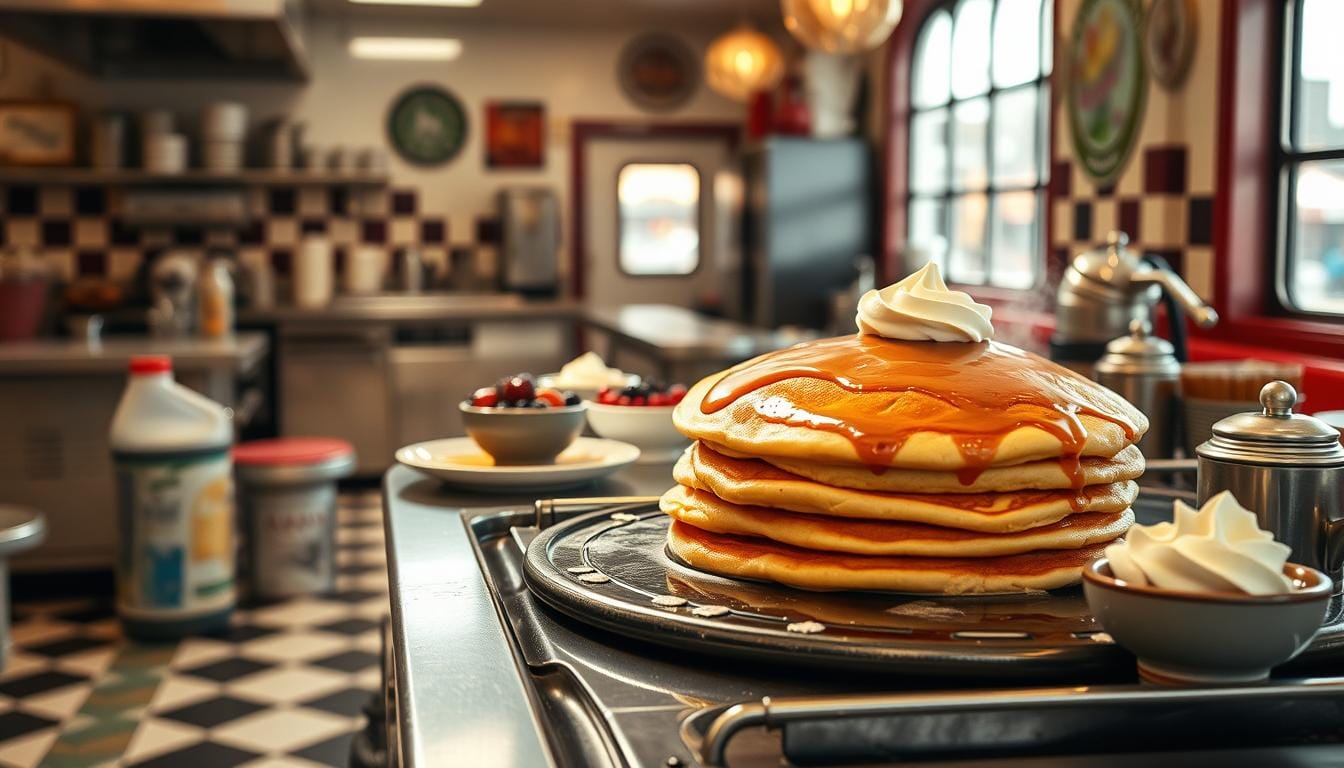Every Saturday morning, the sizzle of the griddle and the aroma of fresh pancakes took me back to my grandfather’s favorite diner. Those diner pancakes were more than just breakfast—they were a culinary masterpiece that seemed impossible to recreate at home. for What makes diner pancakes taste so good?
Your quest to understand what makes diner pancakes taste so good starts with a deep dive into the secrets behind their irresistible flavor. Professional chefs know that creating fluffy pancakes isn’t just about ingredients—it’s about technique . From the precise griddle temperature to the carefully selected pancake ingredients, every element plays a key role.
Professional kitchens like IHOP have mastered the art of creating pancakes that melt in your mouth. They keep wet ingredients ice-cold, use flat-top griddles for consistent heat, and employ nonstick surfaces that create a perfect golden-brown exterior.
Malted milk powder emerges as a game-changing ingredient in diner pancakes. According to 2022 F&W Best New Chef Caroline Schiff, just one tablespoon can transform your pancake experience, adding a subtle malty sweetness that elevates the entire dish.
Table of contents
The History of Diner Pancakes for What makes diner pancakes taste so good?
Pancake history goes back thousands of years. It has traveled through many cultures and traditions. From ancient times to today’s American diners, pancakes have changed a lot.
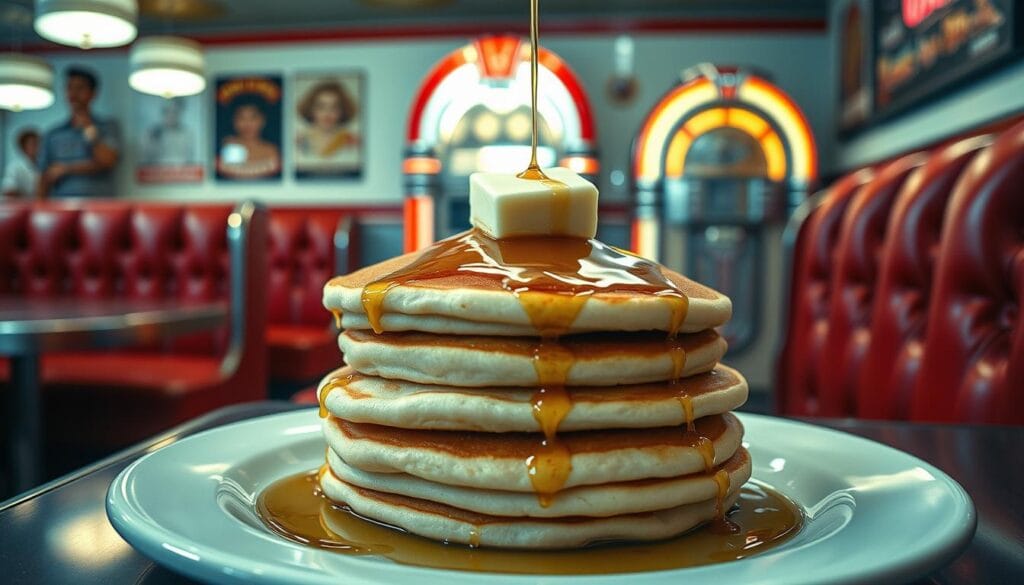
The history of pancakes is rich. Our ancestors made early versions of pancakes by grinding grains about 30,000 years ago. Different cultures have shaped pancakes over time:
- Greeks made early pancake versions around 500 B.C.E.
- Romans wrote down pancake recipes in the fifth century C.E.
- Dutch settlers brought American-style pancakes in the 1700s
The Origins of Pancakes
Early pancakes were not like today’s diner pancakes. They were dense and flat, made from ground grains. The addition of eggs, milk, and baking powder in the 19th century made pancakes light and fluffy.
Evolution in Diner Culture
The 1870s saw the rise of American diners. These places made buttermilk pancakes popular. They became a key part of breakfast.
| Era | Pancake Characteristics |
|---|---|
| Pre-1700s | Dense, flatbread-like |
| 1700s-1800s | Introduction of eggs, milk |
| Late 1800s | Baking powder creates fluffiness |
| 20th Century | Classic diner pancakes emerge |
The term “flapjack” came up in the 1870s. It made pancakes a distinctly American breakfast item. Today, pancakes keep changing, showing off global flavors while staying true to diner culture.
“Pancakes are more than food—they’re a culinary journey through human history.”
Essential Ingredients for Flavorful Pancakes
Making the perfect pancake is an art. It starts with knowing your ingredients. From flour to eggs, each part is vital for a delicious breakfast.
Flour Types: The Foundation of Great Pancakes
The right flour can make your pancakes amazing. All-purpose flour is common, but try others for different tastes and textures.
- All-purpose flour: Classic and reliable
- Whole wheat flour: Adds nutty flavor and more nutrients
- Pastry flour: Creates lighter, more delicate pancakes
- Gluten-free flour blends: Perfect for dietary restrictions
Eggs: The Secret to Perfect Pancake Texture
Eggs are key for the perfect pancake texture. They add richness, structure, and help mix ingredients well.
“Fresh eggs are the key to fluffy, tender pancakes that melt in your mouth.” – Diner Chef Wisdom
Fresh Ingredients Make All the Difference
Using fresh ingredients makes your pancakes stand out. Diners know that quality is essential.
| Ingredient | Impact on Pancakes |
|---|---|
| Fresh milk | Smoother batter, richer flavor |
| Room temperature eggs | Better incorporation, more even mixing |
| Fresh baking powder | Optimal rising and fluffiness |
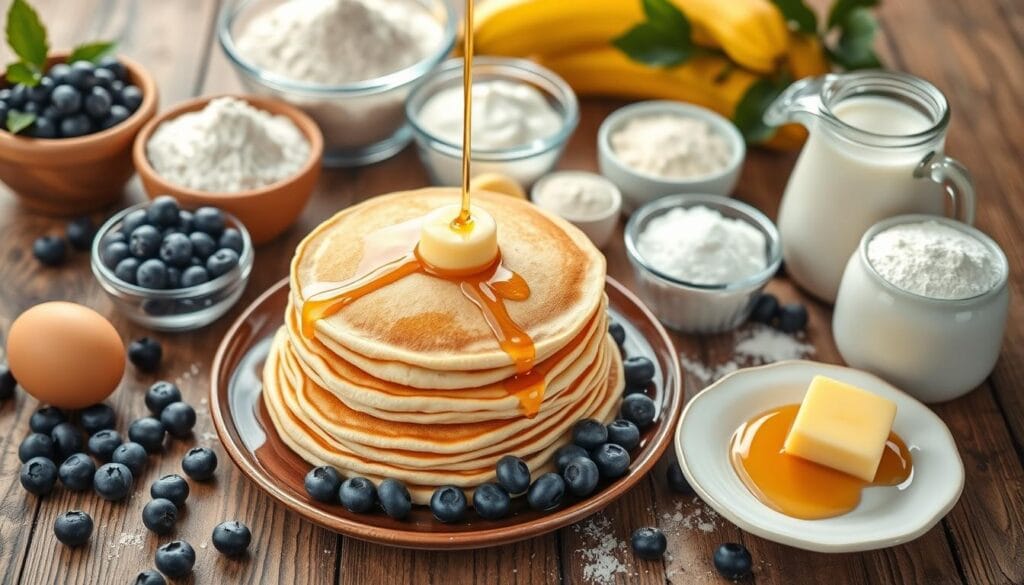
Professional diners serve 40 to 50 pancake orders daily. This shows mastering ingredients is vital for breakfast success.
The Magic of Buttermilk in Pancakes for What makes diner pancakes taste so good?
Buttermilk pancakes are a breakfast favorite. They add amazing flavor and texture to your morning. The secret is buttermilk, which makes the batter special.
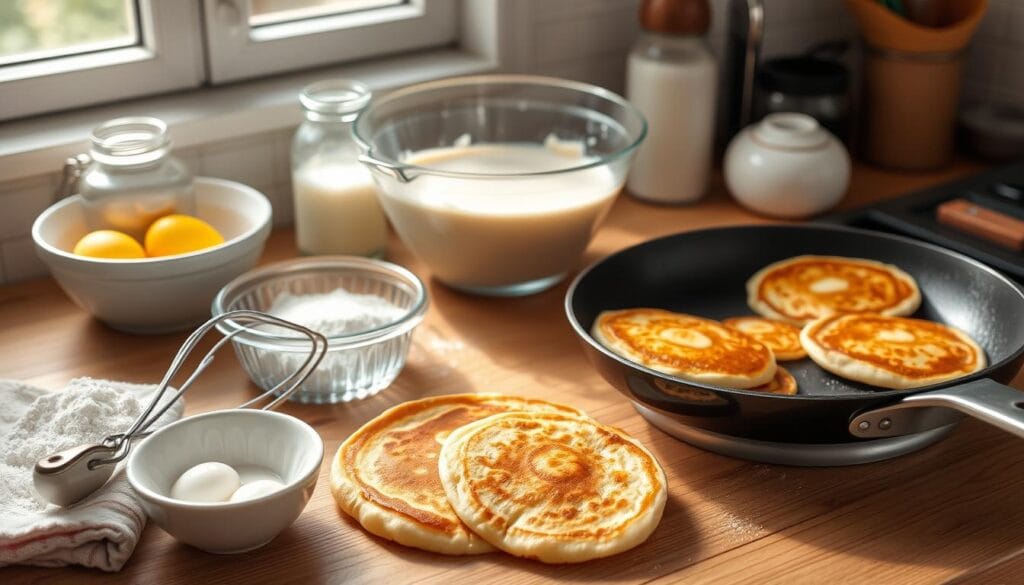
- Creates a tangy, rich pancake flavor
- Helps pancakes rise with natural acidity
- Produces an incredibly tender texture
What Buttermilk Does to the Pancake Flavor
Buttermilk’s acidity breaks down gluten, making pancakes soft. Its tangy taste adds depth that regular milk can’t. Bakers say it makes pancakes go from good to great.
Substitutes for Buttermilk
Need buttermilk? No worries, there are great substitutes:
- Milk + Lemon Juice: Mix 1 cup milk with 1 tablespoon lemon juice
- Yogurt Blend: Thin plain yogurt with a bit of milk
- Sour Cream Mixture: Dilute sour cream with water
“The key is maintaining the right acidity to achieve fluffy, delicious pancakes.” – Professional Chef
Try buttermilk substitutes for pancakes that are just as tasty. Whether you use real buttermilk or a substitute, your pancakes will be light, flavorful, and irresistible.
Signature Techniques for Perfect Pancakes
Mastering pancake techniques is an art that turns breakfast into a special experience. Both professional chefs and home cooks agree. Making the perfect pancake is more than just mixing ingredients.
The Art of Mixing the Batter
Mixing the batter is key to making pancakes light and fluffy. Here are the essential steps:
- Sift dry ingredients from a height to incorporate air
- Create a well in the center for wet ingredients
- Gently combine ingredients with minimal stirring
- Rest the batter for 20-30 minutes to allow starch expansion
“The secret to great pancakes is in the gentle touch of mixing,” says professional chef Martha Stewart.
Achieving the Perfect Griddle Temperature
Griddle temperature is vital for pancake perfection. Aim for medium-high heat around 375°F (190°C). Use these tips for even cooking:
- Preheat the griddle for at least 5 minutes
- Test temperature with a water droplet test
- Use a large, evenly heated surface
- Adjust heat to maintain consistent temperature
Remember, practice makes perfect in pancake techniques. Each batch will improve your skills. Soon, you’ll make restaurant-quality pancakes in your kitchen.
Toppings That Enhance Diner Pancakes of What makes diner pancakes taste so good?
Choosing the right toppings can turn a simple breakfast into a feast. Diner pancakes are a blank slate for tasty adventures. They offer more than just butter and syrup.
Classic Maple Syrup vs. Modern Syrups
Maple syrup is a favorite for its deep, sweet flavor. It’s been a breakfast favorite for years. But now, diners are trying new syrups to mix things up:
- Bourbon-infused maple syrup
- Lavender honey syrup
- Chocolate-hazelnut drizzle
- Caramel-sea salt variations
Fresh Fruits: Nature’s Sweet Topping
Fresh fruits add sweetness and health to your pancakes. Strawberries, blueberries, and bananas add flavor and vitamins. Diners are making fruit compotes that are full of taste.
Whipped Cream and Creative Choices
Whipped cream makes pancakes special. Some places offer:
- Vanilla-bean whipped cream
- Citrus-infused whipped cream
- Chocolate whipped cream
But there’s more. Adventurous eaters try things like Greek yogurt, honey, or even herbs and cheese.
“The perfect pancake is a blank canvas waiting for your culinary creativity!” – Diner Chef Wisdom
Diner Dishes: Pancakes of with a Twist What makes diner pancakes taste so good?
Diner pancakes are more than just the usual recipes. Chefs enjoy trying out new pancake ideas that amaze people. They mix up classic breakfasts with exciting twists, like chocolate and savory pancakes.
Chocolate Pancakes: A Sweet Indulgence
Chocolate pancakes add a rich, sweet twist to breakfast. Chefs share some tips for making these pancakes perfect:
- Add chocolate chips during cooking, not in the batter
- Use cocoa powder for rich chocolate flavor
- Sprinkle nuts for extra crunch and texture
Savory Pancake Adventures
Savory pancakes let chefs get creative. They use unexpected ingredients to turn sweet breakfasts into filling meals.
| Ingredient Category | Savory Pancake Options |
|---|---|
| Cheese | Cheddar, parmesan, feta |
| Herbs | Chives, basil, thyme |
| Vegetables | Spinach, bell peppers, corn |
“Pancakes are a canvas for culinary creativity!” – Chef Michael Rodriguez
Looking for chocolate pancakes or savory twists? Diners are always trying new things. Try different ingredients and find your favorite pancake mix!
Why Diner Pancakes Are Fluffy for What makes diner pancakes taste so good?
Pancake science shows us why diner pancakes are so fluffy. It’s all about how leavening agents turn a simple batter into a light, airy treat.
Diner chefs know how to make pancakes fluffy. They use special techniques and understand chemical reactions. Leavening agents are key to creating those air pockets we love.
The Science Behind Fluffiness
Making fluffy pancakes is all about balance. It’s about the science of gas expansion in the batter. Here’s what makes pancakes so perfect:
- Chemical reactions that create air bubbles
- Precise mixing techniques
- Careful temperature control
Baking Powder vs. Baking Soda for What makes diner pancakes taste so good?
The battle of leavening agents is between baking powder and baking soda. Each has its own role in your pancake batter:
| Leavening Agent | Activation Method | Pancake Effect |
|---|---|---|
| Baking Powder | Moisture and Heat | Creates multiple rise points |
| Baking Soda | Requires Acid (Buttermilk) | Provides quick, intense rise |
Pro tip: For truly fluffy pancakes, mix gently. Overmixing kills the air bubbles that make pancakes light. Diner cooks say a few lumps are a good thing!
“Pancake fluffiness is a delicate art of chemistry and technique.” – Diner Chef Wisdom
Next time you enjoy fluffy diner pancakes, think about the science behind them. It’s not just cooking; it’s pancake science in action!
The Sizzle of the Diner Experience
When you step into a classic American diner, you feel the warmth of a special place. It’s more than just a place to eat. It’s a cultural experience that shows the heart of American hospitality.
Diners are not just places to eat. They are where memories are made, conversations flow, and community bonds grow. The diner experience is about feeling welcome, comfortable, and being part of something special.
Atmosphere: More than Just Food
Classic diners have unique designs that make them inviting:
- Retro chrome accents
- Comfortable vinyl booths
- Neon signage
- Open kitchen layouts
“A diner is not just a restaurant, it’s a slice of Americana.” – Unknown Diner Enthuasiast
The Charm of the Diner Staff
The diner staff is key to a great dining experience. Their friendly nature, quick service, and personal touch make a meal unforgettable.
| Staff Characteristic | Impact on Diner Experience |
|---|---|
| Remembering Regular Customers’ Names | Creates a sense of belonging |
| Quick and Efficient Service | Ensures customer satisfaction |
| Friendly Conversation | Enhances overall dining mood |
The magic of a diner is not just in its food. It’s in making you feel at home. From the sizzling griddle to the server’s warm smile, every detail adds to a genuine and comforting diner experience.
Pancakes Across America: Regional Variations
American pancakes tell a delicious story of culinary diversity. Each region adds its own twist to these beloved breakfast classics. This turns regional pancakes into a true gastronomic journey across the United States.
Exploring pancake variations reveals the rich tapestry of American culinary traditions. From the cornmeal-based johnnycakes of New England to the hearty potato pancakes of the Midwest, each region offers a distinct flavor profile. This reflects local ingredients and cultural influences.
Southern Style of What makes diner pancakes taste so good?
Southern American pancakes stand out with their distinctive characteristics. They are made with buttermilk and often served with rich cane syrup or molasses. This creates a uniquely sweet and tangy experience.
- Buttermilk as a key ingredient
- Served with traditional cane syrup
- Thicker and more substantial texture
Unique Regional Diner Specialties
Different regions showcase their culinary creativity through unique pancake styles:
| Region | Pancake Specialty | Distinctive Ingredient |
|---|---|---|
| New England | Johnnycakes | Cornmeal |
| Midwest | Potato Pancakes | Shredded potatoes |
| West Coast | Berry Pancakes | Local fresh berries |
| San Francisco | Sourdough Pancakes | Sourdough starter |
| New York | Ricotta Pancakes | Ricotta cheese |
“Pancakes are more than just a breakfast item—they’re a canvas for regional creativity and cultural expression.”
Whether you’re craving the light and airy pancakes of the North or the rich, dense versions from the South, American pancake variations offer something for every palate. Each region’s unique approach transforms these simple breakfast staples into culinary art forms. They celebrate local ingredients and traditions.
Pairing Pancakes with Other Diner Favorites
Your diner breakfast isn’t complete without the right pancake pairings. It’s more than just stacking pancakes. It’s about creating memorable combos.
Breakfast Combos: Eggs, Bacon & More
Classic diner breakfast combos make pancakes special. The right mix can turn a good meal into an unforgettable one.
- Scrambled eggs with crispy bacon
- Over-easy eggs alongside sausage links
- Hash browns with country-style ham
- Loaded pancakes featuring built-in toppings
Drinks That Complement Your Pancakes
No pancake pairing is complete without the right drink. Diners offer drinks that make your meal special.
| Drink Type | Flavor Profile | Best Pancake Match |
|---|---|---|
| Fresh Coffee | Rich, Bold | Classic Buttermilk Pancakes |
| Orange Juice | Citrusy, Bright | Fruit-Topped Pancakes |
| Milkshake | Sweet, Creamy | Chocolate Chip Pancakes |
Your diner breakfast can be a culinary adventure with the right pancake pairings. Try different combos to find your favorite meal.
Tips for Recreating Diner Pancakes at Home
Making diner-style pancakes at home is simpler than you think. With just 30 minutes and a few techniques, you can cook pancakes like your favorite diner. Knowing the right ingredients and methods will change your weekend breakfast.
For the perfect pancake recipe, choose quality ingredients and understand how they mix. Chefs like Evan Algorri and JC Ricks say not to overmix the batter. This keeps pancakes light and fluffy. Mix dry and wet ingredients until they look like oatmeal with small lumps.
Equipment You’ll Need
To make diner-style pancakes, get a large non-stick griddle or skillet. Use a ladle or measuring cup for even pancake sizes. Have a spatula for flipping and a wire rack in a low oven to keep pancakes warm.
Step-by-Step Recipe for Diner-Style Pancakes
Begin by mixing 2 cups of flour, 3 tablespoons of sugar, 1.5 teaspoons each of baking powder and baking soda. In another bowl, whisk 2 eggs, 2¼ cups of buttermilk, 3 tablespoons of melted butter, and ½ teaspoon of vanilla extract. Gently mix wet and dry ingredients, then rest the batter for 30 minutes. Preheat your griddle, grease it with oil, and cook pancakes until bubbles form. Don’t press down on the pancakes while they cook.
